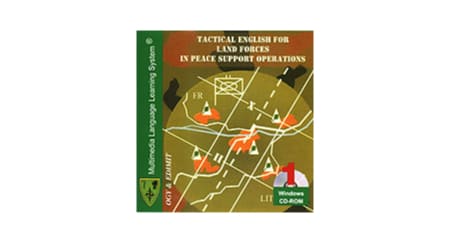A CD-ROM designed by a German officer and English teachers from Bulgaria and Lithuania to help peacekeepers improve their English is proving so successful that the British Council has bought several hundred copies and distributed them to military academies in more than 20 countries to promote the learning of English.
The CD-ROM, entitled Tactical English for Land Forces in Peace-Support Operations, was designed specifically to help non-native speakers of English prepare for NATO-led operations like those in Bosnia and Herzegovina, Kosovo and the former Yugoslav Republic of Macedonia* where the language of communication between militaries is English. It is an equally effective tool for peacekeepers preparing for UN missions.
"Experience of peace-support operations has shown how important it is for officers to have a good command of the English language," says Lieutenant-Colonel Bernhard Klotz, a German officer based at the Joint Headquarters Centre in Heidelberg, Germany, who conceived and oversaw the project. "The idea behind the CD-ROM is to practise as many skills as possible - speaking, reading, writing and understanding - through interactive exercises which keep officers curious by testing their knowledge of the missions they are likely to be involved in."
Students can research questions by reading relevant sections of the CD-ROM before answering multiple-choice tests, which are automatically marked by computer. Reading is made easy by a glossary of difficult words. Students are also able to listen to the way in which a native speaker says something and then repeat the same sentence, comparing pronunciation with the benefit of a computer-generated printout.
In 1999, Lt-Col Klotz prepared a tailored English-language programme for officers involved in peace-support operations with a textbook and accompanying cassettes, 1,500 of which were produced. The CD-ROM was developed because of the expense involved in mailing out packages of books and cassettes and because many more soldiers would be able to make use of it, if placed on a military headquarter's internal computer network.
Lt-Col Klotz prepared the book with the help of English teachers from Lithuania's Public Service Language Centre because a Lithuanian publisher had won the printing contract. He worked with a Bulgarian teacher of English from the country's National Defence Academy to produce the CD-ROM because a Bulgarian software company won the tender to manufacture the CD-ROMs.
The CD-ROM has proved especially popular with officers from Partner countries, who have generally had less opportunity to learn English in the course of their education than officers from NATO member states, as they prepare to deploy in the NATO-led peacekeeping operations in the former Yugoslavia. It can be used both by individuals and groups and does not require a teacher. Moreover, it is preferable to distance learning over the internet since there are no telephone-connection costs to pay.
The British Council bought 500 CD-ROMs and distributed them to military academies in 23 countries where it has an advisory role for the teaching of English to encourage and assist soldiers learning English. "It's a nice compliment that the British Council is using a CD-ROM produced by a German officer," says Lt-Col Klotz.
Austria, Canada, France and Switzerland have also made bulk purchases of the CD-ROM to assist officers in their militaries improve their English. In the case of Austria, learning English is now a formal part of the curriculum and the Military Academy in Wiener-Neustadt, south of Vienna, bought both 25 CD-ROMs and 500 packages of books and cassettes.
Each year, about 90 English teachers receive training in Heidelberg in using the CD-ROM effectively, among other things, each of whom goes on to train on average another 40 officers. "In this way, we are able to reach a broad range of officers," Lt-Col Klotz says.
Lt-Col Klotz will move to the Baltic Defence College in Tartu, Estonia, in August, where he will teach military tactics. Since teaching at the Baltic Defence College takes place entirely in English, prospective students would do well to go through the CD-ROM before enrolling.
Copies of the CD-ROM Tactical English for Land Forces in Peace-Support Operations can be purchased from Ogy and Edimit (edimit@ogy-edimit.com), the manufacturer in Sofia, Bulgaria, for 50 Euros. Reduced rates are given for purchases of more than 100 CD-ROMs.
* Turkey recognises the Republic of Macedonia with its constitutional name.

